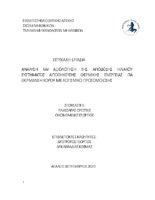| dc.contributor.advisor | Καββαδίας, Κοσμάς | |
| dc.contributor.advisor | Στρωτός, Γεώργιος | |
| dc.contributor.author | Πλασσαράς, Ορέστης | |
| dc.contributor.author | Οικονομίδης, Γεώργιος | |
| dc.date.accessioned | 2021-01-04T13:13:33Z | |
| dc.date.available | 2021-01-04T13:13:33Z | |
| dc.date.issued | 2020-10-06 | |
| dc.identifier.uri | http://okeanis.lib2.uniwa.gr/xmlui/handle/123456789/5533 | |
| dc.description.abstract | Η παρούσα έρευνα, έχει σαν σκοπό την τεχνοοικονομική ανάλυση της συμπεριφοράς ενός ηλιακού συστήματος θερμικής αποθήκευσης, το λεγόμενο TESS (Thermal Energy Storage System). Στην μελέτη αυτή ερευνάται το ποσοστό θερμικών αναγκών του κτηρίου Ζ το οποίο μπορεί να καλύψει αυτή η τεχνολογία, βελτιώνοντας την ενεργειακή θερμική απόδοση του κτηρίου Ζ του ΑΕΙ Πειραιά Τ.Τ.
Η ηλιακή ενέργεια, η οποία αποτελεί την πηγή ενέργειας του συστήματος TESS, αποθηκεύεται στην δεξαμενή αποθήκευσης της θερμικής ενέργειας, αφού πρώτα συλλεχθεί μέσω των επίπεδων ηλιακών συλλεκτών, οι οποίοι μεταφέρουν μέσω ενός ρευστού (συνήθως νερό) την θερμική αυτή ενέργεια. Οι ακτίνες του ήλιου πρέπει να βρίσκουν την επιφάνεια του συλλέκτη όσο πιο κάθετα γίνεται, καθώς έτσι έχει αποδειχτεί ότι είναι μεγαλύτερο το ποσοστό συλλογής της ενέργειας. Άλλοι παράγοντες που επηρεάζουν την απόδοση του συστήματος είναι η επιφάνεια των συλλεκτών καθώς και ο όγκος της δεξαμενής αποθήκευσης ζεστού νερού για θέρμανση του χώρου. Όσον αφορά την τεχνοοικονομική ανάλυση σχετικά με το μέγεθος της δεξαμενής και την επιφάνεια των συλλεκτών του TESS εκτελούμε πειραματικά διάφορους συνδυασμούς με βασικό κριτήριο μία βιώσιμη λύση, πετυχαίνοντας την υψηλότερη δυνατή κάλυψη των θερμικών αναγκών μειώνοντας παράλληλα το κόστος της επένδυσης. | el |
| dc.format.extent | 75 | el |
| dc.language.iso | el | el |
| dc.publisher | Α.Ε.Ι. Πειραιά Τ.Τ. | el |
| dc.rights | Αναφορά Δημιουργού-Μη Εμπορική Χρήση-Όχι Παράγωγα Έργα 3.0 Ελλάδα | * |
| dc.rights | Αναφορά Δημιουργού-Μη Εμπορική Χρήση-Όχι Παράγωγα Έργα 3.0 Ελλάδα | * |
| dc.rights | Αναφορά Δημιουργού-Μη Εμπορική Χρήση 3.0 Ελλάδα | * |
| dc.rights.uri | http://creativecommons.org/licenses/by-nc/3.0/gr/ | * |
| dc.subject | TPSH::Τεχνολογία::Ηλιακή Ενέργεια::Ηλιακοί Συλλέκτες | el |
| dc.title | Τεχνοοικονομική ανάλυση της συμπεριφοράς ηλιακού συστήματος αποθήκευσης θερμικής ενέργειας για θέρμανση χώρων με χρήση εμπειρικού συντελεστή απωλειών δεξαμενής | el |
| dc.type | Πτυχιακή εργασία | el |
| dc.contributor.committee | Αλέξης, Γεώργιος | |
| dc.contributor.department | Τμήμα Μηχανολόγων Μηχανικών Τ.Ε. | el |
| dc.contributor.faculty | Σχολή Τεχνολογικών Εφαρμογών | el |
| dc.subject.keyword | TRNSYS | el |
| dc.subject.keyword | Ηλιακοί συλλέκτες | el |
| dc.subject.keyword | Συστήματα θέρμανσης | el |
| dc.subject.keyword | Δεξαμενή θερμικής αποθήκευσης | el |
| dc.subject.keyword | Ενεργειακή μελέτη | el |
| dc.subject.keyword | Λογισμικό προσομοίωσης | el |
| dc.subject.keyword | Αποθήκευση ενέργειας | el |
| dc.description.abstracttranslated | This research aims to determine whether it is feasible to install a seasonal thermal energy storage system in order to meet the thermal energy demands of the building Z of the University of West Attica 2.
The problem of capturing energy for later use is an idea that has been troubling scientists for years. In particular, the importance of storing thermal energy was known in humanity since ancient times where thermal energy coming from the sun needed to be stored in the structural elements of the building and be recovered when the sun was no longer present. Nowadays Thermal Energy Storage (TES) is considered an advanced energy technology that serves a wide range of applications like building heating/cooling, district heating/cooling, hot water generation, utility load smoothing, etc. Such technology can be beneficial mainly by shifting the thermal load from periods of high demand to periods of low demand or by exploiting heat from the sun or industrial processes that otherwise would be wasted. Whichever the way, the result should always be translated as a reduction in the initial or operational cost of the equipment used for heating or cooling. In the present research, seasonal thermal energy storage is selected in order to cover a large part or total thermal energy of the building complex. After defining the needs for thermal energy, an investigation is carried out concerning the location of the installation, the appropriate material to be used, the size and type of the thermal storage tank, and the rest of the required equipment. This method will result in potential energy savings for the building complex of the University and will derive conclusions on the financial feasibility of this attempt. This research will be beneficial mainly to the University of West Attica 2 by providing quantitative data about the potential installation of an efficient and economically feasible seasonal TES system on its facilities. Furthermore, it may also help in raising interest in TES usage in Greece and comprise a point of reference for other similar educational organizations that would be interested in applying such technology to their facilities. | el |


